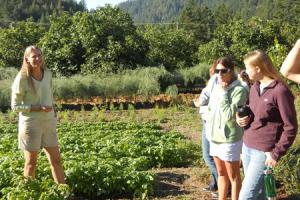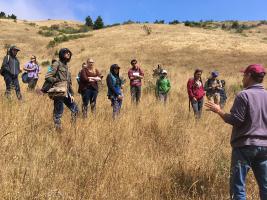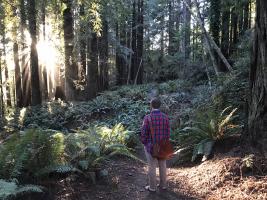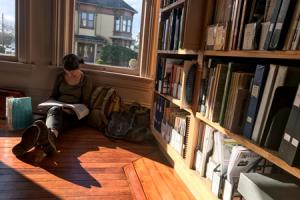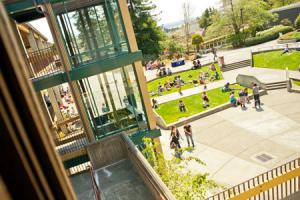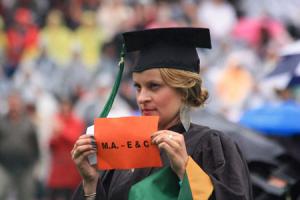Fall 2010
Nick Goulette and Lynn Jungwirth, Watershed Research and Training Center
September 16
“Community-based Forestry: Past, Present, and Future”
Nick Goulette is the Executive Director of the Watershed Research and Training Center (WRTC). Nick’s work at theWRTC has focused on coordinating local collaboration with the US Forest Service associated with forest restoration and fuel reduction activities, community-based and regional research into forest work contracting and wood utilization, developing assistance programs for local contractors, training in stewardship authorities and collaboration throughout the west, and advocacy for national forest, energy, and development policies that benefit rural communities. Prior to coming to WRTC, Nick worked on private forest management planning and projects in the Northeast with a private forestry consulting firm. He earned a B.S. in Forestry from the University of Vermont (2004) with a concentration in Community-based Forestry.
Lynn Jungwirth is a Senior Fellow for Policy and Development at the WRTC. Lynn was born and raised in a milling and logging family in a small timber town in Oregon. She received a B.A. in English Literature from the University of Oregon in 1971. She has been an activist on social issues in forest towns and a leader in community-based forestry and sustainable development for twenty years. She has worked with various communities from across the West attempting to rebuild their economies around forest stewardship. She served on the Collaborative Stewardship Taskforce with Forest Service Chief Mike Dombeck and on the Board of Directors for the National Network of Forest Practitioners. She currently serves on the Board of Directors of The Forest Guild, is an elected member of the Social Chamber of the Forest Stewardship Council – US, and serves on the Western Governors Association – Forest Health Advisory Committee. Lynn was the founding Chair of the Communities Committee of the 7th American Forest Congress from 1996 to 2000. Lynn is now on the Board of Directors for the Watershed Center and continues to run the Policy Program, while also contributing to organizational fundraising and development.
September 23
“Integrating Renewable Resources: Making the “Smart Grid” Work”
Watch full presentation
Dr. Alexandra “Sascha” von Meier is a professor in the Department of Environmental Studies and Planning at Sonoma State University, where she directs the Energy Management & Design program and teaches courses on energy technology and society, thermal and electrical energy management, small-scale energy sources, passive solar design, and quantitative methods. Her research has addressed both engineering and cultural dimensions of diverse aspects of energy technology, including electric power distribution, grid-connected photovoltaics, electric demand response, nuclear power plant operation, nuclear materials management, and green building performance.
At the California Institute for Energy and Environment, Dr. von Meier is currently collaborating with faculty from U.C. Berkeley and Sacramento State University on “smart grid” research, focusing on technical and operational issues associated with the integration of high levels of renewable energy. Her textbook, Electric Power Systems: A Conceptual Introduction (Wiley-IEEE, 2006), has been used in university courses and industry to help explain the complexities of operating the electric grid, and she regularly presents tutorials on electric power delivery to academic and professional audiences.
Professor von Meier received her Ph.D. in energy and resources (1995) and her B.A. in physics (1986) from the University of California, Berkeley. Also at Berkeley, she was a postdoctoral fellow in the electrical and nuclear engineering departments, and lecturer in energy and resources. She has been a consultant to Pacific Gas & Electric, the California ISO and the California State University on a variety of projects related to electric transmission, distributed generation and building energy management, and has testified before Congress on the potential contributions of energy efficiency and renewable resources. She serves on the Board of Directors of the American Council for an Energy-Efficient Economy (ACEEE). Away from the office, Sascha enjoys cycling, rock climbing and the mountains whenever possible.
October 7
“Is Humboldt Bay Municipal Water District’s water system sustainable? Is California’s water use sustainable?”
Aldaron Laird is a Director and Vice-President of the Humboldt Bay Municipal Water District. Aldaron is also the Vice-Chair of the north coast regional board of the Association of California Water Agencies (ACWA) and represents the north coast region on the state board of ACWA. Before joining the water district, Aldaron served for ten years on the City of Arcata’s Planning Commission. Aldaron is a professional environmental planner in private practice for twenty years who specializes in regulatory compliance for projects involving California’s waters and wetlands.
October 28
“Big Box Stores and Global Environmental Governance”
Peter Dauvergne is Professor of Political Science, Canada Research Chair in Global Environmental Politics, and Director of the Liu Institute for Global Issues at the University of British Columbia. He is also the founding and past editor (2001-2008) of the journal Global Environmental Politics. His book, The Shadows of Consumption (The MITPress), won the 2009 Gerald L. Young Award, presented by the Society of Human Ecology for the best book authored in 2008 in the field of human ecology. His ninth book, Timber (co-authored with Jane Lister), is forthcoming with Polity Press in March 2011.
November 4
“Working in the Political Dead Zone”
Elizabeth “Betsy” Watson holds a Ph.D. in Sociology from Rutgers University and is a Professor of Sociology at Cal Poly Humboldt where she is the Co- director of the Institute for Study of Alternative Dispute Resolution (ISADR). She offers courses in social theory, conflict resolution, social ecology, and public policy and public participation.
Dr. Watson has mediated timber harvest plans, land use conflicts, water disputes and conducted other collaborative problem improving processes. While providing mediation services for natural resource conflicts she continues to develop a “community building process” that promotes the healing of old conflicts so that a new way of engaging community issues may be developed. Through her work with rural communities she has learned to respect the power of addressing past grievances when working with contemporary problems. is Professor of Sociology and Director of the Institute for Study of Alternative Dispute Resolution (ISADR) at Cal Poly Humboldt.
December 2
“Humboldt County’s Renewable Energy Futures: Preliminary Results from a Renewable Energy Secure Communities (RESCO) Study”
Watch full presentation
Peter Alstone and Colin Sheppard, Schatz Energy Research Center Humboldt County is uniquely positioned to achieve high levels of renewable energy development, meeting a large fraction of our energy needs with local resources. The RESCO study is exploring Humboldt County’s possible energy futures in 2030, incorporating renewable energy resource assessments, economic impact analysis, and policy development to form a cohesive picture of the potential. This talk is the first in a two-part RESCO results series and presents preliminary results from the renewable energy resource and technology assessment. We discuss how a diverse set of emerging and existing energy technologies can meet our local energy needs while developing the capacity for Humboldt County to be an exporter of renewable electricity. Additionally, we examine the potential for Humboldt to serve as a test bed for emerging solutions like energy storage and demand response. The second talk in the RESCO series will occur in Spring 2011, and will focus on the economic impacts of renewable energy development in the County and policy pathways for encouraging smart energy development.
Peter Alstone and Colin Sheppard are Research Engineers at the Schatz Energy Research Center. They are both alumni of the Humboldt Environmental Resources Engineering Masters Program and have served as instructors in the Engineering Department.

